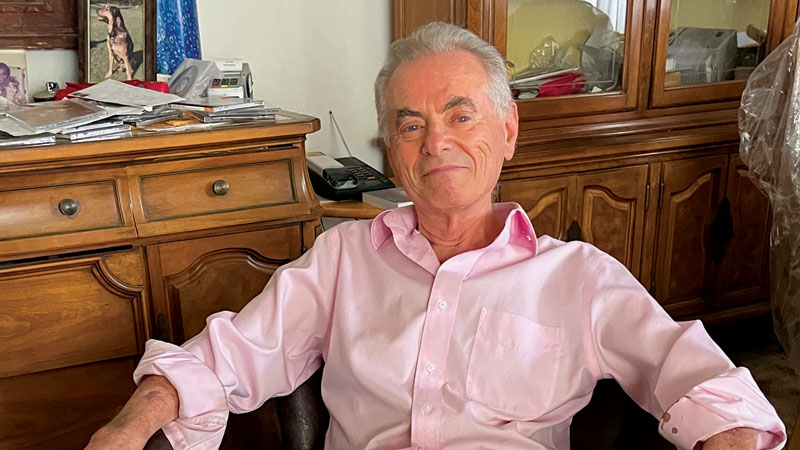Simon Rutberg hadn’t set foot on Fairfax Blvd in years. In fact, it’s been nearly two decades since he closed his record store there in 2006. The memories are too painful and there are too many of them.
In a way, he grew up on this street. As a child, he would go shopping with his mother at the Jewish market and bakery. Trips to Fairfax always excited him because that was when he got to visit Norty’s, the Jewish record store, to check out their latest arrivals. Later, in his late teens, he worked there and in 1989, he took over the location and opened his own record store, Hatikvah.
Today, there’s nothing left of the street as he knew it. Solomon’s Bookstore, Schwartz’s Kosher Bakery and other Jewish stores have been replaced by street-wear shops, Flight Club LA, skateboard stores and pop-up shops that change frequently. Almost nothing remained of the Jewish street it once was, except for a few establishments like Canter’s Deli.
But what became of the store owners who had to close their doors after so many years? Rutberg, for one, moved his massive collection of over 9,000 records, cassettes and CDs to his West Hollywood apartment. I met him at his home, where shelves and dozens of boxes filled with inventory crowded the space. He apologized for the mess, explaining that after 27 years, he was moving out because the building’s new owners had sold it, forcing him and the rest of the tenants to leave. It was a familiar story. The same thing happened to him in 2006 when a businessman began buying up blocks on Fairfax Avenue, pushing him and many others out.
“I refuse to walk down the block; it just hurts too much,” he said. “There are stickers and graffiti everywhere—it’s dirty and neglected. In my time, people swept the sidewalks outside their stores. The street was clean. Fairfax was the center of Jewish life. When people said, ‘We’re going to Fairfax,’ everyone knew what that meant—those two blocks where you could buy anything you needed. Today, there is nothing Jewish about it.”
Rutberg was born in Russia and moved with his parents to Belgium and then to theU.S. before his eighth birthday. “We first lived in Dallas, and I went to Dallas Hillel Academy, which was my first introduction to Judaism. When I was 10, we moved to Los Angeles. Fairfax was the Jewish neighborhood in town and Fairfax High was 99% Jewish. But we lived on the wrong side of town, in Vermont, because we couldn’t afford to live there.”
Years later, when the family could afford to move to the Fairfax District and Rutberg could have attended Fairfax High, he chose to continue at Belmont High School. “I didn’t feel like I had anything in common with the Jewish students. I felt more comfortable among Black and Mexican students, as my school had an overwhelmingly African American and Mexican population. I loved listening to R&B. That’s the music I grow up on.”
Nevertheless, his parents insisted on sending him to Hebrew school in the afternoons, and he walked a mile and a half to Sinai Temple and back home in the dark. “We couldn’t afford bus fare, so I walked,” he said.”
 Rutberg loved Norty’s Music Center at 436 N Fairfax Avenue, just across from Canter’s. He spent so much time there that the owners knew him by name. “Steve Barri was always behind the counter, writing. One day, when I was 18, Norty asked if I’d like to work there. I said, ‘Sure, but what about Steve?’ Norty said Steve had found another job. He later became vice president of Dunhill Records and I found out that he was writing hit songs while sitting in the store.”
Rutberg loved Norty’s Music Center at 436 N Fairfax Avenue, just across from Canter’s. He spent so much time there that the owners knew him by name. “Steve Barri was always behind the counter, writing. One day, when I was 18, Norty asked if I’d like to work there. I said, ‘Sure, but what about Steve?’ Norty said Steve had found another job. He later became vice president of Dunhill Records and I found out that he was writing hit songs while sitting in the store.”
He wasn’t the only songwriter who started there. Jerry Leiber who also worked at Norty’s, became a very successful composer, writing with his partner Mike Stoller many R&B and pop songs. Together, they wrote hit songs for Elvis Presley like “Jailhouse Rock” and “Hound Dog,” to name a few. Rutberg recalled that as a teenager he used to see Phil Spector coming to the store often. “It was a hangout place.”
The store featured both American, world music and Yiddish and Israeli music. “After the Six-Day War in 1967, Israeli music exploded. ‘Jerusalem of Gold’ was played constantly and we started importing music from Israel. Many Israeli singers started coming here,” Rutberg said. “We had no competition for Israeli and Jewish music.”
Rutberg stayed at the store until 1971 and then moved to work independently in other businesses, but kept in touch with the store’s owner until she decided to sell it.
He seized the chance to take over, rented the location and reopened the store under a new name: Hatikvah. “I knew the business inside and out. Whenever I admired a singer, I’d call them directly. I called Yaffa Yarkoni, and she recorded ‘Sabra Sings Yiddish’ with both Hebrew and Yiddish songs, which I released under my own label. I reintroduced a lot of Israeli and Yiddish music that had gone out of print. Beside Jewish music I also produced three CD box sets by the late Jackie Wilson, who was my best friend.”
Rutberg’s eyes lit up as he recounted the golden days when people would visit his store to find records. He and other store owners didn’t even lock their doors when stepping out; everyone looked out for each other. “You just left and came back and nothing was stolen. My favorite time of the day was closing up and looking at the inventory, knowing I had the biggest Jewish music collection in the world. For me, it was a library of our culture.”
“My favorite time of the day was closing up and looking at the inventory, knowing I had the biggest Jewish music collection in the world.”
Since moving his collection home, Rutberg has sold some of it privately and recently donated many CDs to the Workers Circle. But he still has much left. His dream is to find a new home for his collection, perhaps sell it to a museum or a library that appreciates its value.
“It hurts to see it go. I would have loved for someone to keep the Jewish music alive,” he said.
For more information, visit hatikvahmusic.com.




